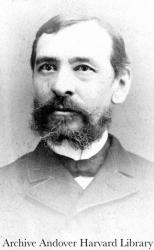Planning worship?
Check out our sister site, ZeteoSearch.org,
for 20+ additional resources related to your search.
- |
User Links
Person Results
John Warrington Hatton
1710 - 1793 Person Name: John Hatton Composer of "DUKE STREET" in Jubilate Deo John Warrington Hatton (b. Warrington, England, c. 1710; d, St. Helen's, Lancaster, England, 1793) was christened in Warrington, Lancashire, England. He supposedly lived on Duke Street in Lancashire, from where his famous tune name comes. Very little is known about Hatton, but he was most likely a Presbyterian, and the story goes that he was killed in a stagecoach accident.
Bert Polman
John Warrington Hatton
William Knapp

1698 - 1768 Person Name: William Knapp, 1698-1768 Composer of "WAREHAM" in Singing the Living Tradition Born: 1698, Wareham, Dorsetshire, England.
Died: September 26, 1768, Poole, Dorsetshire, England.
Buried: Poole, Dorsetshire, England.
William Knapp
Herbert Stanley Oakeley
1830 - 1903 Composer of "ABENDS" in The Cyber Hymnal
Herbert Stanley Oakeley
William Henry Monk

1823 - 1889 Person Name: W. H. Monk Arranger of "MELCOMBE" in Isles of Shoals Hymn Book and Candle Light Service William H. Monk (b. Brompton, London, England, 1823; d. London, 1889) is best known for his music editing of Hymns Ancient and Modern (1861, 1868; 1875, and 1889 editions). He also adapted music from plainsong and added accompaniments for Introits for Use Throughout the Year, a book issued with that famous hymnal. Beginning in his teenage years, Monk held a number of musical positions. He became choirmaster at King's College in London in 1847 and was organist and choirmaster at St. Matthias, Stoke Newington, from 1852 to 1889, where he was influenced by the Oxford Movement. At St. Matthias, Monk also began daily choral services with the choir leading the congregation in music chosen according to the church year, including psalms chanted to plainsong. He composed over fifty hymn tunes and edited The Scottish Hymnal (1872 edition) and Wordsworth's Hymns for the Holy Year (1862) as well as the periodical Parish Choir (1840-1851).
Bert Polman
William Henry Monk
Seth Curtis Beach

1837 - 1932 Person Name: Seth Curtis Beach, 1837-1932 Author of "Mysterious Presence, Source of All" in Singing the Living Tradition Seth Curtis Beach was born on August 8, 1837 in western New York State. He was a Unitarian minister, author, poet and hymnist. The family lived in a log cabin they had built on a fifty acre farm near the village of Marion, New York. His mother and older sister tutored him until he was eight.
In 1858 he enrolled at Antioch College in Yellow Springs, Ohio, but transferred to Union College in Schenectady, New York and gradated from there with an A.B. degree in 1863. As a Unitarian, Beach enrolled at Harvard Divinity School to prepare for the ministry. After college he preached as a supply minister for a number of churches eventually settling at All Souls Unitarian Church in Augusta, Maine in 1867. He also served as minister at First Church in Dedham and later in Bangor. He published several books of sermons, served as secretary of the national Unitarian Ministerial Union, and was appointed Superintendent for Missionary Work in Northern New England for the American Unitarian Association (AUA). He visited struggling parishes in Maine, New Hampshire and Vermont helping them to solve congregational problems.
Seth Curtis Beach died in 1932. The Unitarian Year Book called him “the dean of our Unitarian ministers.”
NN, Hymnary editor. Source: Dictionary of Unitarian & Universalist Biography, www25.uua.org/uuhs/
Seth Curtis Beach
Joseph Haydn

1732 - 1809 Person Name: Francis Joseph Haydn Composer of "HURSLEY" in Heart and Voice Franz Joseph Haydn (b. Rohrau, Austria, 1732; d. Vienna, Austria, 1809) Haydn's life was relatively uneventful, but his artistic legacy was truly astounding. He began his musical career as a choirboy in St. Stephen's Cathedral, Vienna, spent some years in that city making a precarious living as a music teacher and composer, and then served as music director for the Esterhazy family from 1761 to 1790. Haydn became a most productive and widely respected composer of symphonies, chamber music, and piano sonatas. In his retirement years he took two extended tours to England, which resulted in his "London" symphonies and (because of G. F. Handel's influence) in oratorios. Haydn's church music includes six great Masses and a few original hymn tunes. Hymnal editors have also arranged hymn tunes from various themes in Haydn's music.
Bert Polman
Joseph Haydn
Samuel Webbe

1740 - 1816 Composer of "MELCOMBE" in Isles of Shoals Hymn Book and Candle Light Service Samuel Webbe (the elder; b. London, England, 1740; d. London, 1816) Webbe's father died soon after Samuel was born without providing financial security for the family. Thus Webbe received little education and was apprenticed to a cabinetmaker at the age of eleven. However, he was determined to study and taught himself Latin, Greek, Hebrew, French, German, and Italian while working on his apprenticeship. He also worked as a music copyist and received musical training from Carl Barbant, organist at the Bavarian Embassy. Restricted at this time in England, Roman Catholic worship was freely permitted in the foreign embassies. Because Webbe was Roman Catholic, he became organist at the Portuguese Chapel and later at the Sardinian and Spanish chapels in their respective embassies. He wrote much music for Roman Catholic services and composed hymn tunes, motets, and madrigals. Webbe is considered an outstanding composer of glees and catches, as is evident in his nine published collections of these smaller choral works. He also published A Collection of Sacred Music (c. 1790), A Collection of Masses for Small Choirs (1792), and, with his son Samuel (the younger), Antiphons in Six Books of Anthems (1818).
Bert Polman
Samuel Webbe
Eliezer ben Yitzchok Gerowitsch
1844 - 1913 Person Name: Eliezer Gerovitch, 1844-1914 Composer of "ADON OLOM" in Hymns of the Saints
Eliezer ben Yitzchok Gerowitsch


 My Starred Hymns
My Starred Hymns


